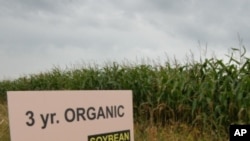Some organic crops produce nearly as much as conventional agriculture, but most still fall short, according to a new analysis.
With a growing world population and limited land available to feed it, the study has implications for the debate on how to feed the world sustainably.
But some note there is more to sustainability than just crop yields.
Organic advocates say farming without artificial fertilizers and pesticides has less environmental impact.
But skeptics note organic farming generally produces less food per hectare. Lower yields means feeding the world organically would require clearing more land. Deforestation for agriculture is already a major contributor to climate change and biodiversity loss.
The new study in Nature looks at how big the gap is between conventional and organic yields.
More productive
The study combines 66 earlier yield studies. “Conventional yields are typically higher than organic yields, but with certain management practices, certain environmental conditions, and certain crop species this yield difference can be quite small,” says lead author and McGill University researcher Verena Seufert.
On average, organic crops produced 25 percent less than conventional.
Vegetables and cereal crops (maize and wheat, for example) performed worse: 33 and 26 percent, respectively. But organic fruits and other perennials nearly matched conventional yields. So did legume crops like soybeans that produce some of their own fertilizer.
The organic penalty was smaller on organic farms that relied on rainfall, which were 17 percent less productive, compared to irrigated farms, which fell behind by 35 percent.
“Under rainfed conditions where water supply varies depending on weather conditions, the organic soil can actually provide water better to the crops because it can capture and maintain this water for longer,” Seufert says.
Harder to manage
One area where organic farmers could improve, she says, is giving their crops enough nitrogen fertilizer. Those that received more nitrogen had smaller yield differences, she says.
But that’s harder to do organically with just manure and crop rotations, she says.
“In conventional agriculture, you just dump inorganic nitrogen fertilizer on the plants and they grow; while in organic agriculture, you need to manage the system. You need to manage the soil. You need to improve the soil quality,” Seufert says.
And besides fertilizers, farms that also used industry-standard best management practices for weeds and pests reached nearly 90 percent of conventional yields.
Land issue
If organic crops were given the right amount of nutrients and protected from weeds and pests, they could produce the same amount as conventional crops, says agronomist Ken Cassman at the University of Nebraska at Lincoln.
But he says that’s not the issue.
“The problem is the land issue, if you’re talking global food security,” he says. “Because either you’ve got to have [a] longer [crop] rotation or you have to bring nutrients from outside the system somehow.”
Organic farmers rotate food crops with plants that fertilize the soil. But while fertilizer crops are growing, food crops are not. So food has to be grown somewhere else.
Or farmers fertilizer with manure. But it takes grazing land or crop land to feed the animals that make the manure.
The world’s food demand will grow by 70 percent by mid-century, according to the United Nations. Cassman says researchers need to figure out how to meet the demand on the same amount of land that farmers are using today.
“There really isn’t much good land left that’s not, for instance, rainforest, or wetlands, or grassland savannah, which are the last carbon-rich and biodiverse regions that we have,” he says.
Hybrid farming
“I think when people see these studies, their first reaction is, ‘Well, my goodness, organic farming can’t feed the world,’” says Washington State University soil scientist John Reganold. “Guess what? Conventional farming cannot sustainably feed the world.”
He says it takes a lot of energy to make artificial fertilizer, and experts say some key ingredients are running out.
And he adds that sustainability means more than just producing high yields, according to the U.S. National Academy of Sciences. The environment, social justice and economic viability are important, too.
He says organic and conventional systems are bookends - extremes at opposite ends of the spectrum. He says more and more, farming is becoming a hybrid of both.
The University of Nebraska's Ken Cassman says the arguments over ideology are a distraction.
“You don’t focus on whether organic is better or conventional is better,” he says. “You simply focus on the outcome.”
“In my personal food decisions, I have a mix," says study author Verena Seufert. "And I think we do have to have to have that on a larger scale.”
News
Study: Most Organic Crops Fall Short on Yields

Lower yields means feeding world organically requires clearing more land






